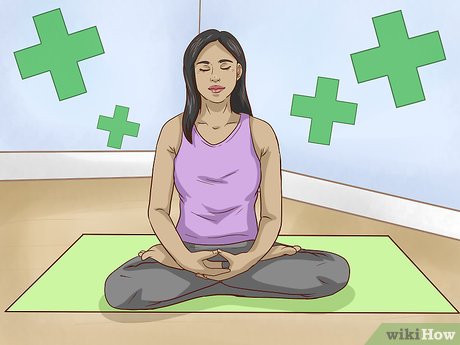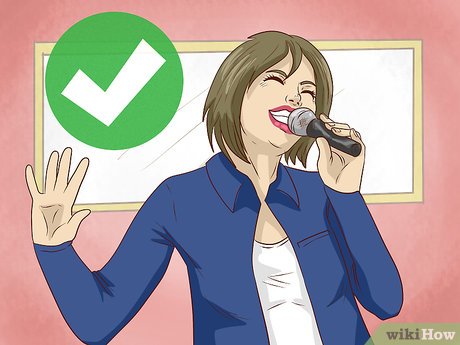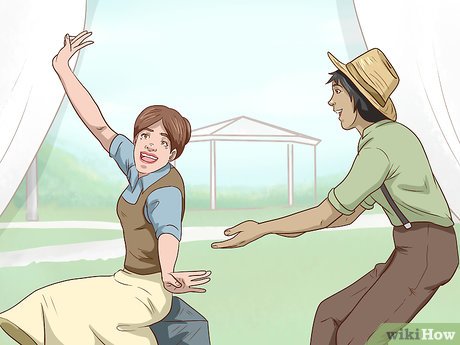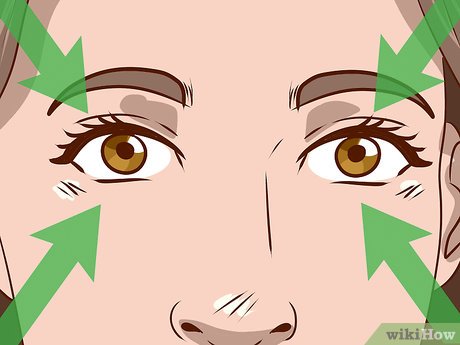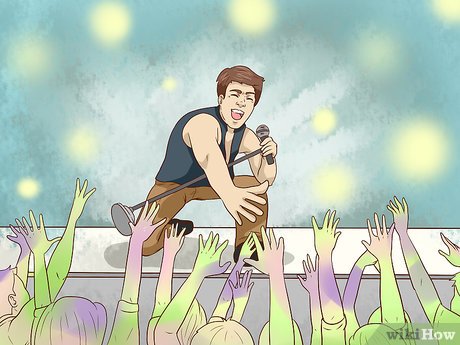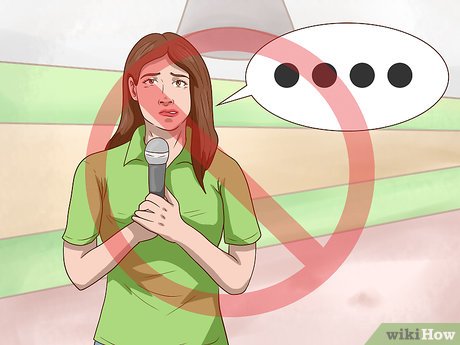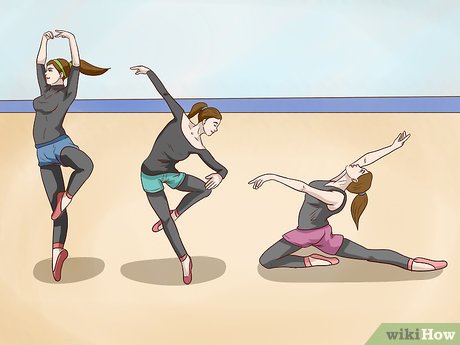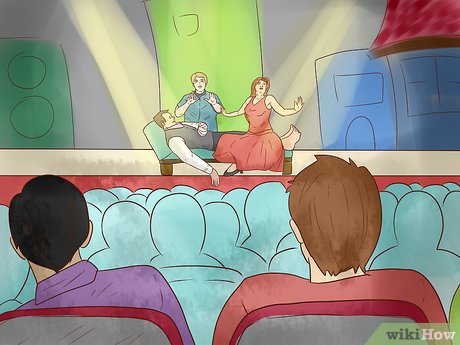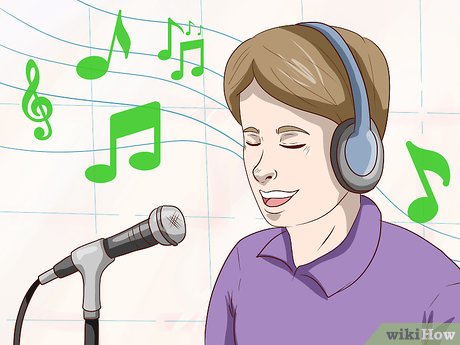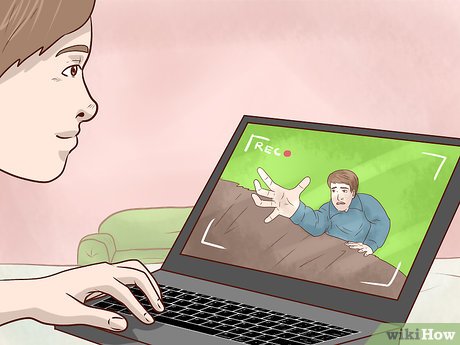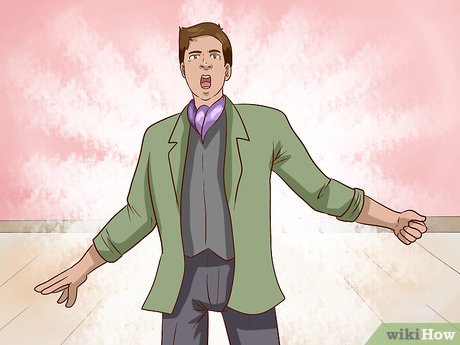How to Perform
Method 1 of 3:
Handling Your Nerves
-
 Breathe deeply to calm your body. When you're nervous, your muscles lock up and your breathing gets irregular, which can negatively impact your performance. To counteract this, close your eyes and take big, deep breaths to relax. Hold the breath for 3-5 seconds, then slowly let it out.[1]
Breathe deeply to calm your body. When you're nervous, your muscles lock up and your breathing gets irregular, which can negatively impact your performance. To counteract this, close your eyes and take big, deep breaths to relax. Hold the breath for 3-5 seconds, then slowly let it out.[1] -
 Allow yourself to acknowledge and accept the nerves. Stage fright is natural, and something that many performers struggle with. One thing not to do when you're nervous is to run away from the feeling—that makes it seem even scarier. Instead, take a step back and look at your anxiety objectively. Tell yourself your nerves are normal and OK to have, and that they can even make you a better performer![2]
Allow yourself to acknowledge and accept the nerves. Stage fright is natural, and something that many performers struggle with. One thing not to do when you're nervous is to run away from the feeling—that makes it seem even scarier. Instead, take a step back and look at your anxiety objectively. Tell yourself your nerves are normal and OK to have, and that they can even make you a better performer![2]- Being nervous isn't something to be afraid of. It might not feel comfortable, but you know you're strong enough to handle the discomfort and perform your best anyway.
- For example, you could tell yourself, 'This is a big recital, so of course I'm nervous. That's OK. I'm going to perform the best I can anyway.'
-
 Control your adrenaline with focused, positive thoughts about the performance. Being nervous means that you have adrenaline coursing through your body, and that can be a good thing before a big performance. Instead of allowing that adrenaline to run wild and make you nervous and worried, focus it into positive thoughts and actions to boost your confidence.[3]
Control your adrenaline with focused, positive thoughts about the performance. Being nervous means that you have adrenaline coursing through your body, and that can be a good thing before a big performance. Instead of allowing that adrenaline to run wild and make you nervous and worried, focus it into positive thoughts and actions to boost your confidence.[3]- For example, you could channel your adrenaline into physical movement, such as drumming your fingers or nodding your head. You could also walk or even dance around to get out your jitters.
- Mentally, use your energy to acknowledge your worried thoughts, then turn towards excited, upbeat ones. Think about how hard you've worked for this, how excited you are, and how ready you feel.
- Many performers find that some healthy pre-show jitters give them the burst of adrenaline they need to give an amazing show. Embrace your nerves as a way to help you perform your best.
-
 Cut off repetitive worrying when you notice it. Bad nerves can sometimes send you into a worry spiral that's hard to break out of. Stop the cycle before it starts by first noticing when you begin to worry. Stop yourself and accept that you feel nervous, but that that feeling doesn't have to control you.[4]
Cut off repetitive worrying when you notice it. Bad nerves can sometimes send you into a worry spiral that's hard to break out of. Stop the cycle before it starts by first noticing when you begin to worry. Stop yourself and accept that you feel nervous, but that that feeling doesn't have to control you.[4]- For example, you might find yourself thinking something like, 'I'm not prepared for this. I'm going to mess everything up.' Instead of continuing in this vein, say, 'This just means I have some nerves. I practiced hard for this. It's natural to be nervous, but it doesn't mean I'm going to mess up.'
- If you're worrying about past mistakes or failures, try saying to yourself, 'I've worked hard since then and learned from mistakes. I've improved a lot, and now I get the chance to show it.'
-
 Try positive visualization and meditation to relax. Sit or stand in a comfortable position and close your eyes. Picture yourself giving a great performance, and let yourself feel those emotions—confidence, strength, elation, and more. Letting that image fill you up will give you the boost of confidence you need to make it a reality.[5]
Try positive visualization and meditation to relax. Sit or stand in a comfortable position and close your eyes. Picture yourself giving a great performance, and let yourself feel those emotions—confidence, strength, elation, and more. Letting that image fill you up will give you the boost of confidence you need to make it a reality.[5]- Positive visualization has been proven to improve performance in many different arenas, so give it a shot!
-
 Turn your nerves into enthusiasm once you're onstage. You still might feel a rush of nerves when you step onstage. Instead of freezing up, channel that nervous energy into a big smile or an enthusiastic wave or gesture. This is a great way to cover up your anxiety while connecting with the audience.[6]
Turn your nerves into enthusiasm once you're onstage. You still might feel a rush of nerves when you step onstage. Instead of freezing up, channel that nervous energy into a big smile or an enthusiastic wave or gesture. This is a great way to cover up your anxiety while connecting with the audience.[6]- If you're a musician, you could smile, nod to the crowd, and walk briskly to your spot. In less formal settings, you could even jump around or run onstage.
- If you're acting or giving a speech, walk on confidently and in character. If you're dancing, walk onstage as you've rehearsed, smiling or looking confidently at the crowd if it matches the mood of your performance.
Method 2 of 3:
Having Great Stage Presence
-
 Move naturally and confidently. The way you hold your body onstage has a big effect on the audience's perception of you. No matter how nervous you are or how weird it feels, go in with confidence and positivity. Stand straight and look around calmly and with self-assurance to show that you're strong and in control.[7]
Move naturally and confidently. The way you hold your body onstage has a big effect on the audience's perception of you. No matter how nervous you are or how weird it feels, go in with confidence and positivity. Stand straight and look around calmly and with self-assurance to show that you're strong and in control.[7]- If you're a musician, move naturally to the music. This could mean walking, dancing, or jumping around if you're in a band, or closing your eyes and swaying if you're performing a more classical piece.
- If you're an actor or dancer, perform your character or mood with intensity and enthusiasm. Throw your whole body into it and don't hold anything back.
- If you're giving a speech or doing a comedy routine, channel your confidence into your voice and your gestures. Walk around on the stage if it feels comfortable and move your head and hands naturally.
-
 Make eye contact with your audience. When you avoid looking at the crowd, it conveys insecurity. Instead, look out at your audience as much as you can to show your confidence and bring them into your performance.[8]
Make eye contact with your audience. When you avoid looking at the crowd, it conveys insecurity. Instead, look out at your audience as much as you can to show your confidence and bring them into your performance.[8]- This may feel awkward at first, but making eye contact looks natural and strong from an audience's standpoint.
-
 Interact directly with your audience as much as feels natural. Different types of performances call for different kinds of audience interaction, but make sure to reach out in some way during your show. You can even plan out how to do this beforehand, deciding when you should turn to look at them, ask a question, or tell a story.[9]
Interact directly with your audience as much as feels natural. Different types of performances call for different kinds of audience interaction, but make sure to reach out in some way during your show. You can even plan out how to do this beforehand, deciding when you should turn to look at them, ask a question, or tell a story.[9]- As a musician, an interaction might be as simple as a moment of eye contact and an inclusive smile. In a less formal context, you could even chat with your audience, ask them how they're doing, or encourage them to clap or sing.
- If you're an actor, you could give your audience a pointed look after a funny line. As a dancer, consider going out into the audience to dance. As a speaker or comedian, ask them questions and encourage answers.
-
 Show your audience that you're enjoying yourself however you can. Relax the muscles in your body and face, let yourself smile, and move around with positive energy. Showing your audience that you enjoy performing will make them enjoy watching you!
Show your audience that you're enjoying yourself however you can. Relax the muscles in your body and face, let yourself smile, and move around with positive energy. Showing your audience that you enjoy performing will make them enjoy watching you! -
 Wear clothes that make you feel cool and confident. If you can choose your clothes, go for something that makes you feel good. Your performance is a setting where you can get away with wearing something a little more out of the ordinary, so go for it! Make sure your clothes match the mood of the performance as well.[10]
Wear clothes that make you feel cool and confident. If you can choose your clothes, go for something that makes you feel good. Your performance is a setting where you can get away with wearing something a little more out of the ordinary, so go for it! Make sure your clothes match the mood of the performance as well.[10]- If you're on an elevated stage, the audience will have a good view of your shoes, so make sure that they're part of your unified look.
-
 Avoid moments of silence when you perform. Unless silence is written into your script, song, or performance plan, it's best to avoid it. Accidental quiet during a performance can make the audience feel awkward and show that you're not in control of the performance.[11]
Avoid moments of silence when you perform. Unless silence is written into your script, song, or performance plan, it's best to avoid it. Accidental quiet during a performance can make the audience feel awkward and show that you're not in control of the performance.[11]- If you're a musician, for example, know and practice exactly when you'll transition into the next song, or have a few things ready to say in between songs to fill in the gaps.
- As an actor, be ready with every line and prepare to improvise a little, just in case anyone else forgets theirs.
- If you're speaking or doing a comedy routine, it's OK to take pauses for effect, to let your audience react, or to catch your breath. Make sure to continue your speech or act when it feels appropriate, or as soon as the audience quiets again.
Method 3 of 3:
Practicing Before You Perform
-
 Practice under anxiety-inducing conditions. Studies have shown that practicing under higher-pressure situations can help you perform better during the real deal. Try to replicate a high-pressure performance environment when you rehearse by inviting groups of people to watch you. You can also try practicing on the same stage that you'll be performing on, or a similar one.[12]
Practice under anxiety-inducing conditions. Studies have shown that practicing under higher-pressure situations can help you perform better during the real deal. Try to replicate a high-pressure performance environment when you rehearse by inviting groups of people to watch you. You can also try practicing on the same stage that you'll be performing on, or a similar one.[12]- Set challenges for yourself, such as, 'If I make it through this song with no mistakes, I'll treat myself to some ice cream.' Even putting small stakes on your rehearsals can up the pressure and get you used to it.
-
 Rehearse your full show multiple times. It can be tempting to simply practice the parts of your performance that you struggle the most with, but this can interrupt the flow of your show and create an uneven final product. Instead, run through your whole performance as many times as you can to get comfortable with the length, the transitions, and what it feels like to go from the start to the finish.[13]
Rehearse your full show multiple times. It can be tempting to simply practice the parts of your performance that you struggle the most with, but this can interrupt the flow of your show and create an uneven final product. Instead, run through your whole performance as many times as you can to get comfortable with the length, the transitions, and what it feels like to go from the start to the finish.[13] -
 Watch similar performances to give you ideas and confidence. Watching performers that you look up to can give you inspiration and confidence in your own show. See how they add their own flair to their performances and work to emulate that in your own way to develop stage presence.[14]
Watch similar performances to give you ideas and confidence. Watching performers that you look up to can give you inspiration and confidence in your own show. See how they add their own flair to their performances and work to emulate that in your own way to develop stage presence.[14]- For example, if you're in a band, look up performances by groups in the same genre. Look at the way the band members interact, how they move around the stage, and what makes them fun to watch, then think about how you can incorporate similar things into your own set.
- If you're in a play, watch similar plays and see how the actors embody their characters while maintaining their stage presence.
-
 Memorize your lines or music as best you can. Playing off of sheet music, looking at notes, or reading your lines puts up a barrier between you and your audience, making the performance less enjoyable. Work to memorize your performance so you can maintain your connection with the crowd and not feel reliant on anything but your own ability.[15]
Memorize your lines or music as best you can. Playing off of sheet music, looking at notes, or reading your lines puts up a barrier between you and your audience, making the performance less enjoyable. Work to memorize your performance so you can maintain your connection with the crowd and not feel reliant on anything but your own ability.[15] -
 Record and watch your rehearsals to see what you need to work on. Set a camera across the room from you and run through your full performance. Play back the recording and watch yourself closely, looking for areas that you can work on. Using a recording gives you a more objective look at your show, closer to what the audience will see, which is a great way to find things you didn't know you needed to improve on.[16]
Record and watch your rehearsals to see what you need to work on. Set a camera across the room from you and run through your full performance. Play back the recording and watch yourself closely, looking for areas that you can work on. Using a recording gives you a more objective look at your show, closer to what the audience will see, which is a great way to find things you didn't know you needed to improve on.[16]- Look for mistakes in the performance itself, such as missed lines or notes, as well as moments of awkwardness.
-
 Build up your confidence so you're ready to perform enthusiastically. Think positively, work on the things you need to work on, and give yourself credit for the things you're doing great at. Having confidence is key to a great performance, so work on boosting yours with every practice session.
Build up your confidence so you're ready to perform enthusiastically. Think positively, work on the things you need to work on, and give yourself credit for the things you're doing great at. Having confidence is key to a great performance, so work on boosting yours with every practice session.- Accept feelings of nerves and fear, and be patient with yourself. Take pride in the fact that you're doing something a little scary! Working hard and giving your all is the best way to be confident in your performance.
Share by
Lesley Montoya
Update 24 March 2020




